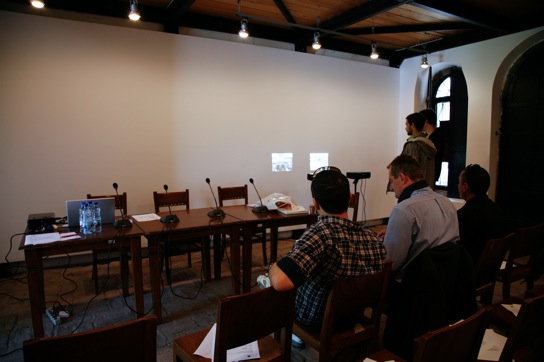
Exhibition and conference
Felix Gmelin: Farbtest, Die Rote Fahne II
September 29 - October 22, 2011.
Opening: September 29, 2011, 19:00.
Conference with Felix Gmelin, Albert Heta, Vjollca Krasniqi, Nita Luci, Catrin Lundqvist, Engjellushe Morina, Edi Muka and Besnik Pula
Moderated by Nita Luci and Albert Heta
October 1, 2011, 10:00.
'Baby (revolution) comeback' aims to reflect on the practices of today and events that led to what we know to be an important and challenging year for activist movements in the world and use the work of an artist or work of art as a starting point for furthering the analyses.
'Baby (revolution) comeback', is based on the reenactment of the conference 'Event1: Vetevendosja as Resistance', (22/9/2007) with Agon Hamza, Tina Finnas, Branimir Stojanovic, Glauk Konjufca, Shkumbin Brestovci, Dukagjin Gorani, Besnik Pula, part of the project 'Politics and Contemporary Art', and the exhibition of Felix Gmelin's 'Farbtest, Die Rote Fahne II' (Color test: The red Flag II), 2002.
'Felix Gmelin's Farbtest, Die Rote Fahne II', 2002, a two-channel video, presents two short tapes that are, at a glance, identical. Closer examination reveals that in fact the images are not quite the same, but very similar. In each one, a runner carries a large red flag through the streets of what appears to be a northern European city, transferring the flag to another participant at various intervals. The sense of historical period is also rather vague: the runners wear similar dark clothes; their hairstyles are not particularly revelatory, either. Perhaps the large number of Volkswagons in the video on the left tips the viewer off that this one was originally filmed in Germany.
Gert Conradt made the film in 1968, in connection with a camera seminar at the Deutsche Film und Fernsehakademi, Berlin, conducted by Michael Ballhaus, who worked with R.W. Fassbinder and later with Martin Scorsese. Gmelin's father was a filmmaker and theorist with radical political convictions, and the event that Conrad captured on film had been enacted by several of Gmelin's students and also Gmelin himself; he appears twice in the film. It documented a 'revolutionary' student action; its final goal was achieved when the final flag-bearer entered the Berlin town hall - the Schoberger Rathaus, where John F. Kennedy made his famous (and famously ungrammatical) 'Ich bin ein Berliner' speech - and reappeared on its balcony waving the red flag. Contrary to what has been written about Farbtest, Die Rote Fahne II, the elder Gmelin did not organize the action himself; he wasn't its 'director' as Gmelin fils is the director of the restaged event in Stockholm, using his own art students as participants in red-flag relay race. In contrast to the triumphant-or at least dramatic-finale of Conrad-s film, the last flag-bearer in Gmelin-s re-enactment enters Stockholm-s town hall but doesn-t appear above brandishing the red flag. The opportunities for revolutionary action are evidently foreclosed, or at least ambiguous, uncertain'. (-Revolutionary Time Warp: Felix Gmelin's Farbtest, Die Rote Fahne II' by David Rimanelli)
'Baby (revolution) comeback' also aims to analyze the never ending Kosovar sitcom about lost chances and the 'civic option' in politics.
The revolution in Kosova was already televised.
'Baby (revolution) comeback' as a reenactment appears in a context and a country with no such practice in the art scene, a country with diminishing archival culture and disappearing public institutions that can function as a memory of a society - 'history making' as a tool for erasure and engineering the past for the present power players is a dominant practice in this country.
Year 2011, finds Levizja Vetevendosje! (Movement for Self-Determination) part of the Parliament of Kosova, with 12 seats out of 100 + 20 seats or until recently the third largest parliamentary group with 14 seats.
'Baby (revolution) comeback' is a project by Albert Heta and Vala Osmani produced for Stacion - Center for Contemporary Art Prishtina, implemented in collaboration with Moderna Museet, Stockholm.
'Baby (revolution) comeback' is supported by The Swedish Institute (SI), Kosova Foundation for Open Society, Ministry of Culture, Youth and Sports, The Kosova Art Gallery, Technomarket and DZG.